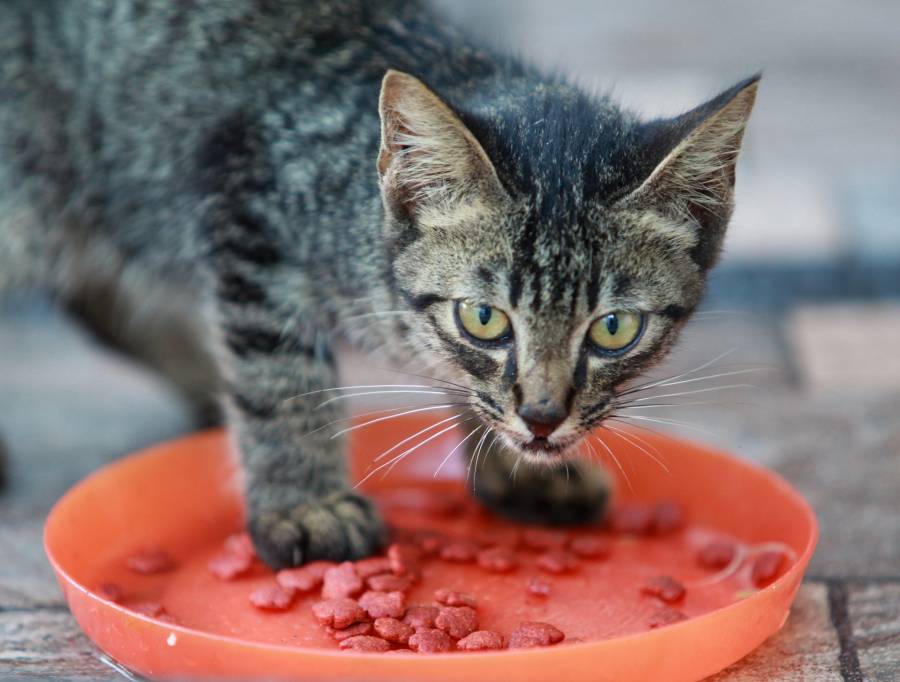Quick Navigation
- 12 Reasons Why Your Cat Is Not Eating After Moving To a New House
- 1. It Misses His Old Home
- 2. It Has Issues With The New Environment
- 3. The Move Was Too Sudden
- 4. Your Cat Doesn’t Like The New Food
- 5. He Needs More Attention
- 6. There Are Too Many Distractions
- 7. Your Cat Isn’t Happy
- 8. You Haven’t Given Your Cat Time To Adjust
- 9. He’s Scared And Stressed
- 10. He’s Bored And Lonely
- 11. He’s Confused
- 12. He’s Missing Something Or Homesick
- Is This Normal For A Cat Not To Eat After Moving?
- Should You Be Worried About Your Cat Not Eating After Moving?
- What To Do If Your Cat Is Not Eating After Moving To A New House
- Will My Cat Be Able To Adjust Right Away?
- Some Safety Tips For Your Cat After Moving
- Conclusion
Is your cat not eating after moving to a new home?
Moving to a new environment can be stressful enough, especially when dealing with an upset cat who refuses to eat.

There are several reasons why your cat might refuse to eat.
Here are some of the most common ones.
12 Reasons Why Your Cat Is Not Eating After Moving To a New House
1. It Misses His Old Home
Moving to a new home is quite a stressful time for cats.
When they move from their familiar surroundings to a new place, it can cause them stress.
This stress can lead to separation anxiety, leading to appetite loss.
If you notice that your cat is losing weight after moving to a new home, try giving him more attention and playing games with him.
You may also want to consider keeping him at your current residence until he gets used to the new environment.
2. It Has Issues With The New Environment
Just like humans, cats have different personalities.
Some cats love changes, while others hate them.
Your cat may have issues with the new environment if he feels uncomfortable.
For example, if he had a bad experience living in the last house, he would think about the new environment.
In addition, if your cat has been exposed to too many changes recently, he may feel overwhelmed.
You should ensure your cat has enough space to explore his new environment.
Also, keep in mind that he may need to return to the breeder if he has trouble adapting to the new environment.
3. The Move Was Too Sudden
If your cat has been living happily at its current home for years, suddenly being moved into a new place could cause them to become stressed out.
Cats are highly sensitive creatures; if they sense stress, they try to protect themselves by refusing to eat.
It is especially true if their previous owner had died or left them.
4. Your Cat Doesn’t Like The New Food
Cats are very selective when it comes to what they eat.
They may prefer one brand over another or even dislike certain foods altogether.
You must ensure that your cat gets the proper nutrition from its diet.
Make sure they eat various foods to receive all the nutrients they need.
This way, your cat won’t feel as though they are missing out on something vital.
5. He Needs More Attention
It’s normal for your cat to miss his family members when he moves to a new home.
However, if he stops eating after moving to a new home, he may need more attention than usual.
Try to spend more time with him, play with him and talk to him as much as possible.
Make sure that you pay close attention to his needs.
6. There Are Too Many Distractions
When cats are used to sleeping in a particular spot, they tend to get attached to it.
If you’ve just moved into a new house, your cat might feel insecure about things around them.
They might also be worried about how they will cope with the noise levels in the new place.
7. Your Cat Isn’t Happy
Sometimes, cats aren’t happy with their new surroundings.
They might think that they would rather live somewhere else.
It is especially likely if they have lived with other pets before.
8. You Haven’t Given Your Cat Time To Adjust
It takes time for a cat to adapt to a change in its life.
If you’re moving into a new home, give your cat plenty of time to settle down.
Try to avoid making any big moves until your cat feels ready to do so.

9. He’s Scared And Stressed
It can be stressful for you and your pet when you move house.
Cats are very sensitive creatures and don’t like change and might even refuse to eat completely.
Your cat will probably feel anxious about leaving the familiar territory and making new friends.
Try to calm him by keeping everything as normal as possible until he feels more comfortable.
Also, try to avoid upsetting your cat by changing things too quickly.
Instead, introduce changes slowly and let him get used to them before adding another.
10. He’s Bored And Lonely
If your cat is not eating after moving to a new house.
Make sure he gets plenty of playtime and exercise to burn off any pent-up energy.
Moving house means you’ll spend less time with your cat than usual.
He may miss having someone to cuddle up to every day.
Give him lots of attention and love to help him adjust to his new life.
11. He’s Confused
You’ve moved house, and your cat is confused that he doesn’t eat its food.
The cat may be unsure about how to behave in a new place.
For example, he may not understand why people aren’t visiting anymore.
You must help him learn what’s going on by explaining everything clearly.
12. He’s Missing Something Or Homesick
Your cat may be missing something important from his previous example, like he may have had a favorite food bowl.
In this case, give him a replacement to continue eating his food.
Also, your cat is not eating after moving to a new house because of homesickness.
He may want to return to his old home and see his family again.
If this is the case, try taking him back to his old home occasionally.
Is This Normal For A Cat Not To Eat After Moving?
Yes, it is quite common for cats to stop eating after moving to a new house.
But don’t worry about it.
Follow our tips, and your cat will return to his old self again!
Should You Be Worried About Your Cat Not Eating After Moving?
Moving to a new house could be as stressful for cats as it is with humans.
If you are certain that moving to a new house is the reason why your cat is not eating, there’s nothing to really worry about.
What To Do If Your Cat Is Not Eating After Moving To A New House
1. Give Him Some TLC
If your cat isn’t eating after moving, the most important thing to do is give him some TLC (tender loving care).
Talk to him gently and stroke him.
It would be best if you also tried to distract him so he doesn’t feel too stressed.
2. Keep An Eye Out For Any Illness
Make sure to keep an eye out for any illnesses that may be affecting your cat.
If he has any symptoms like vomiting, diarrhea, lack of energy, or weight loss, you should take him to the vet immediately.
3. Give Him Plenty Of Water
Cats love drinking water, so ensure you always have plenty of water available.
4. Don’t Let Him Get Cold
Cats are naturally warm-blooded creatures.
So, if you live somewhere cold, you’ll want to ensure that your cat stays warm.
Will My Cat Be Able To Adjust Right Away?
The adjustment period depends would be different for each cat.
But if you bring pieces from your previous place, like the same litter box and food bowls, it might help them adjust faster.
You can also help relieve your cat’s anxiety and stress by making it comfortable with your new place.
If they need space, it’s important that you also grant them space.
Some Safety Tips For Your Cat After Moving
As you transition to new routines at your new place, keep your cat within the confines of your new home for at least two weeks or up to six weeks for it to totally adjust to its new environment.
This keeps your cat from acting out its anxiety by returning to your previous place and getting lost.
After the confinement period, you may let your cat leave the house unsupervised.
Conclusion
So, there you have it – the top reasons your cat might not eat after moving to a different house.
Hopefully, one of these reasons applies to your situation.
In the end, you must provide your cat with the best care possible, and he’ll soon be back to his usual self.

Lucy is a real-time contributor to Purrfect n’ Pawesome, along with being a freelance writer to various pet forums and platforms. She started writing professionally in the year 2016. Earlier, she enjoyed her community life as a pet rescue volunteer and offered boarding services to pet owners. Her extensive experience in the pet field is now the basis for her writing at this site.
She loves to collect animal facts from around the globe and then transform them into amazing stories for her readers. For Lucy, the mission is to bring pet love to every home and equip the pet parents with the required useful and authentic information to nurture their pet accordingly.
She lives with her two cats and a shepherd mix, whom she loves the most. Despite her extremely busy life, she spends some time with wildlife and outer space to relax her mind and enhance her observation.
Purrfect n’ Pawesome is a platform that believes in providing our pets with the right kind of nurturing, care and upbringing to assist them in leading a healthy life. Go to our blog section and read out some pawesome and informative articles to ease your parenthood.
